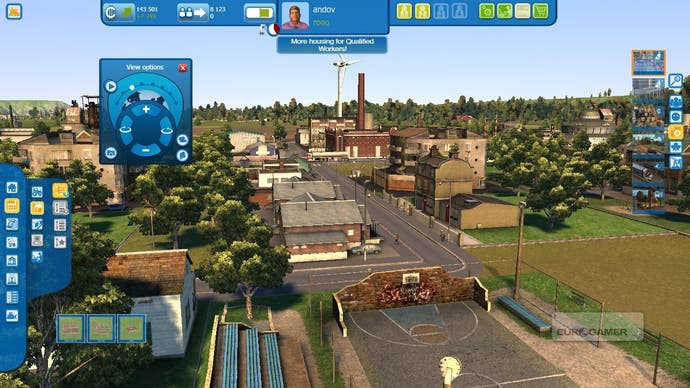Cities XL
Trade and industry.
City-building games are, for some reason, always welcome chez Rossignol. I'm not sure quite what it is about them, but the idea of constructing a vast, smelly metropolis somehow grips me, every time. So approaching Cities XL was definitely done with some enthusiasm: a fancy-looking city-builder with some new ideas, it fills a lot left vacant for some time now.
The concept is neat, too: the merger of the traditional city-builder - founded and developed by the SimCity games and expanded elsewhere - with the internet. Cities XL does provide an offline city-building game, but it also offers the player an option of going online and take their city-management escapades into "planet mode", where you populate worlds alongside other players, and take your work into a global economy. Ambitious stuff.
But let's start off with the fundamentals: the game as city-builder. The mechanical processes of putting a city together are solid - the maps are just about large enough, and the terrain can look fairly beautiful on a high-end PC. The construction is straightforward too: roads are placed with an elegant three-click system, although bridges are ludicrously fiddly to erect. Almost everything else is simply placed down with the same three clicks, and once you've selected the road formation from the menu, you zone your real estate. You can use this to create American-style strip blocks or rather more spidery formations as you see fit.
What's interesting at this stage is that there's a range of industries available, including agriculture. You can give over huge tracts of fertile land to farming, and therefore create a kind of farm-scape that is only partially urbanised. There are, of course, more recognisably urban industries too, with "heavy industry" and offices popping first, and manufacturing and hi-tech down the line.
As you play with these options you begin to notice some of the problems with the Cities XL model. Firstly, some businesses that should generate capital actually end up costing you money. Entertainment, for example a Ferris wheel, is a business and doesn't tend to eat into a city's budget in the real world, although it does here. Even more bizarrely, things like oilfields cost huge amounts of money to maintain.

This causes some genuine bafflement on your initial forays in the game, as it seems to defy logic: strike oil and you're rich, right? Wrong. Unless your city is ready for the extra burden of setting up an oilfield, you might find yourself bankrupt. And I suppose you could argue that the infrastructure required to set up the oil industry really is expensive, but it doesn't seem like it should have be such a monetary disaster for your city. You find yourself battling with the game logic, which does not seem to adhere to expectations.
The other thing that feels fundamentally at odds with smooth city-building is that everything has to be bounded by roads. You can forget about spraying parkland around that executive enclave you've just placed on the hillside, because everything needs to be bounded by your tarmac transport network. I mean, clearly everything needs to have road access, but the idea that parks and markets need to have roads on every side seems unhealthy and illogical.
Speaking of executives, I should mention that your increasing population unlocks various levels of citizen. Initially these are just qualified and unqualified workers, but the selection moves into executives and "elites", who are required to run the more high-end businesses and facilities. This creates a longer game for you to play with. It's easy to fill up a city with a vast sprawl of low-level citizens, but to push to the higher tiers of city-building ambition you need to get creative. Additionally, the kind of zoning you create for these citizen types increases in density as you go, so that you start getting apartment compounds by default in the higher-density areas, dwarfing the standard houses in the lower-density zones. Needless to say, these place a demand on retail, health, policing, and environmental management. All of which costs money.


